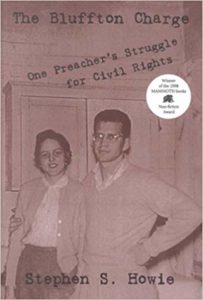The Bluffton Charge: One Preacher’s Struggle for Civil Rights (Mammoth Books)
 During the mid-1950s, John and Beverly Howie worked secretly to bring black and white people together in the low country of South Carolina, where John had been appointed Methodist minister for a circuit of three small towns. The Bluffton Charge: One Preacher’s Struggle for Civil Rights (Mammoth), documents John and Beverly’s efforts to create the first inter-racial council in the South Carolina low country and what happened when their all-white congregation discovered their efforts and put them on trial in their own church. (Winner of the Mammoth Books Nonfiction Award)
During the mid-1950s, John and Beverly Howie worked secretly to bring black and white people together in the low country of South Carolina, where John had been appointed Methodist minister for a circuit of three small towns. The Bluffton Charge: One Preacher’s Struggle for Civil Rights (Mammoth), documents John and Beverly’s efforts to create the first inter-racial council in the South Carolina low country and what happened when their all-white congregation discovered their efforts and put them on trial in their own church. (Winner of the Mammoth Books Nonfiction Award)
PRAISE FOR THE BLUFFTON CHARGE
“The Bluffton Charge chronicals the struggle of two unsung heroes from the early moments of the Civil Rights Movement. It is written with grace and beauty by a son who sets out to understand both those turbulent times and his parents as they were before he was born. He has done a remarkable job.”
– Patsy Sims, The Klan
“Most accounts of the civil rights struggle paint the big picture, and we should know that. But here Stephen Howie makes the fight more vivid as he tells what the battle meant for two dedicated people who symbolize the actions taken to make ours a more humane society.”
– Former U.S. Sen. Paul Simon, Freedom’s Champion: Elijah Lovejoy
“Stephen Howie allows us to vicariously share one young couple’s lonely fight for justice during the early days of the Civil Rights Movement. In telling their story, he also celebrates the thousands whose names never made history books but whose endeavors were no less courageous and important.”
– Morris Dees, co-founder of the Southern Poverty Law Center
“Stephen Howie has pieced together the drama that swirled around one young couple in a small South Carolina town in the 1950s, and he has written about them with such skill and care that their travails take on universal dimensions. In this anti-heroic age, reading The Bluffton Charge will make you yearn to know genuine heroes such as these.”
– John Egerton, Speak Now Against the Day: The Generation Before the Civil Rights Movement in the South